An open letter has been written by a group of 56 academicians, doctors and other professionals to the chief ministers and union territory administrators requesting them to urgently consider reopening schools and resuming in-person classes.
In their letter which has also been marked to the Prime Minister’s Office, Union Health Minister Mansukh Mandaviya, Union Education Minister Dharmendra Pradhan and the National Disaster Management Authority Chairperson, the signatories said COVID-19 vaccination of children should not be a precondition for reopening schools.
“A number of governments have not yet reopened schools for all classes because of concerns including students are not vaccinated, schools appear to be ‘super-spreaders’, fear of a third wave and a rise in cases in areas where schools have been opened…. There is global evidence to support school opening and governments should urgently consider opening schools and resuming in-person classes,” the letter reads. India is among only four to five countries across the world where schools have been closed for such a long time (one-and-half years), it said.
The letter stated, “There is an urgent need to bring children back to school. Since younger children are least at risk, we urge you to permit primary schools to open first, in line with ICMR (Indian Council of Medical Research) recommendations, and then higher classes. We look forward to leaders across political parties coming together for the sake of our children.”
According to the participants, the purpose of vaccination is to prevent severe illness and death and children are at relatively low risk of severe or fatal coronavirus while, vaccination is not a prerequisite for reopening schools.
“Therefore, the benefit of vaccinating children is limited, as they have a low rate of moderate to severe disease and mortality is already low,” the letter said. The letter further highlighted the need for recognising the scale of costs of school closure. It said the issue of school reopening is played up as a “life vs education” issue which is a flawed perspective.
“It is well known that lack of education for students, particularly girls, affects the health and livelihood of the next generation too. These are extreme costs. Governments and task forces must strike a balance of risks, and such balance is overwhelmingly in favour of opening schools,” the letter said.
The signatories include epidemiologist Chandrakant Lahariya, Indian Association of Preventive and Social Medicine national president and Lancet Commission COVID-19 India Task Force member Suneela Garg, former president of the Indian Academy of Pediatrics Naveen Thacker, and Teach For India CEO Shaheen Mistri.
How parents can be ‘emotion coaches’ as kids navigate back-to-school during COVID-19?
Families are once again facing a September of uncertainty, as children head back to school. This problem is worrisome as it is compounded by depressive and anxiety symptoms in children and adolescents that have doubled in the past 18 months.
However, it is an important step for kids to get back in the classroom, because of this reason tone team has been created to study the mental health of children and families since the start of the pandemic to develop strategies that support those who are struggling.
But amid this, we must not forget the well-being of families, as children are most successful when they are jointly supported in both the classroom and at home. Observing, validating and managing emotions is an important part of family health and wellness.
A simple strategy that the parents can use with their children and loved ones is emotion coaching.
How the pandemic got in the way Our family science research group in southern Ontario has recently published three studies highlighting how the pandemic has interrupted relationships and mental health in children and families. Findings were based on an international sample of 549 families and 1,098 children.
We found that pandemic stress falls into one of three categories: economic stress (things like job loss, debt problems), relational stress (showing up, for instance, as more hostility or withdrawal between family members) and pandemic-specific stress (seen in things like being overwhelmed by the news cycle).
In other words, many parents are simply too stressed to provide emotionally supportive responses during parenting exchanges.
That said, not all families have been affected equally. Among the parents we studied, we found that women with a history of early life adversity were the most vulnerable to mental health problems. But men with a history of early life adversity were still at greater risk for mental health problems than men without such early adversity. Parents experiencing mental health challenges creates a ripple effect across the entire family unit. It predicts higher mental health problems in children, psychological distress in parents and parenting challenges.
Even within the same family, one sibling may be struggling more. In a sibling comparison study, forthcoming in the peer-reviewed journal Developmental Psychology, caregivers reported having more parenting challenges over time with the child who had higher levels of anxiety, depression and anger at the start of the pandemic.
This is an important and unique finding since it describes how COVID-19 stress “gets inside the family,” highlighting and widening differences between siblings. This creates an added challenge for parents. What is emotion coaching? Emotion coaching is a pattern of communication that emerged from the work of psychologist John Gottman, and has since become embedded in many types of therapy. That said, it’s not complicated and anyone can do it.
In its simplest form, emotion coaching is a two-step process that parents can use when their child is distressed.
- Parents first validate the emotion. This requires that they identify the emotion by saying something like: “I understand you might be feeling worried …” and then by explaining the emotion: “… because it’s almost September, because you are worried about what back to school will look like and because you have been home for so long.”
This conveys to a child that their feelings make sense, that they are not wrong or bad for feeling the way they do, and that their parent understands them. To remember this step, parents can remind themselves that you’ve got to feel it to heal it.
- After validating the emotion, parents provide support. This may be emotional support that is comforting, reassuring and hopeful. It could also be a sign of togetherness, in saying something like: “I will be here with you every step of the way this fall.”
Next, practical support can take the form of distraction, redirection, problem-solving or encouragement. If a child is focused on the uncertainty of September, parents may suggest doing a fun activity together. If an adolescent is refusing school, parents could provide encouragement or set limits and reinforce expectations. The important thing is the order of emotion coaching steps — first a parent helps their child to feel the emotion (validation), and then the parent helps their child to feel better (support).











